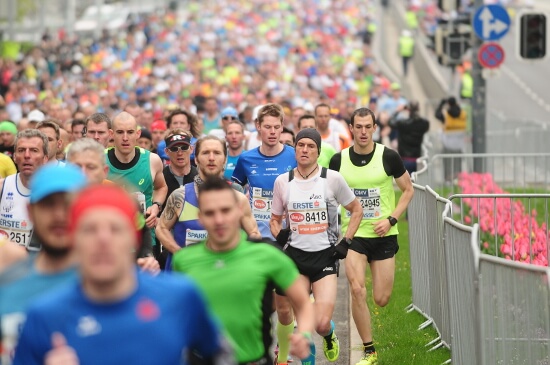The marathon is the supreme discipline of running.
Every year, more than two million people on our planet run the 42.195 km. Almost every runner thinks about his or her target time in preparation for a marathon. Just finishing is not enough for most.
Training for the marathon must be focused on the desired marathon time. Usually the most effective way to calculate a realistic target time is a performance diagnosis with professional support and training planning by a trained running coach.
However, some tools can be used to calculate a realistic marathon time based on previous performance. We present five ways to calculate your marathon time:
1) Using your half marathon best time or 10K best time.
One of the most common methods is to calculate based on your sub-distance performances (Pete-Riegel formula). Take your best times (which should not be too old and should be close to your current performance) from the half marathon and 10k.
Based on the half marathon, calculate your marathon time with the formula "half marathon time * 2.099".
Example: If your half marathon best time is 2:00 hours, you can expect a marathon time of 4:12 hours.
Using the 10km time with the formula "10km time * 4.667".
Example: The 10km best time is 50 minutes: 50 * 4,667 = 3:53 hours
2) Running time calculation formula
A bit more complex but also more flexible is the run time calculation formula (which is also derived from the Pete-Riegel formula).
The formula is: T2 = T1 x (D2/D1)^k
T1 = Given time
D1 = Given distance
D2 = The distance for which the running time is to be calculated
k = The fatigue exponent, which has a static average value of 1.07 (derived from world best times).
That is, this formula can be used for any distance. The problem with it, however, is the fatigue exponent, which are statically given as 1.07. If the target distance and the given distance are very far apart, the calculated result becomes less accurate. However, the formula can certainly be applied to calculate a half marathon best time at marathon pace.
We again take the example of our 2-hour half marathon runner.
The formula is: 120 x (42.2/21.1)^1.07 = 4:12 hours.
2nd example: 10 km in 50 minutes: 50 x (42,2/10)^1,07 = 3:53 hours.
This means that the results from the previous two formulas match exactly.
3) 2 x half marathon time + 8 to 15 minutes
A bit simpler, but also more superficial is this calculation. On average, marathon runners lose about four to seven minutes each on both half marathon distances compared to their half marathon best time. This formula is quite good to get an idea of the possible range of marathon times.
Using the example of our 2-hour half marathon runner, he could assume a marathon time between 4:08 hours (ideally) and 4:15 hours (if it goes ok).
4) 10 km best time x amount of training
Two other calculation options based on training performance were recently presented by the experienced running coach Peter Greif. The first option is based on the amount of training. The more the runner runs per week, the faster his marathon time could be.
> 120 km per week: 10 km best time x 4.55
90 - 119 km per week: 10 km best time x 4.6
70 - 89 km per week: 10 km best time x 4.7
50 - 69 km per week: 10 km best time x 4.8
30 - 49 km per week: 10 km best time x 4.9
In the case of our runner who completes the 10 km in 50 minutes, a marathon time of 3:48 hours would be possible with a high volume of over 120 km per week. If he were to do less than 50 km, the marathon target time increases to 4:05 hours.
5) 10 km tempo endurance run + 5min/km
A very simple calculation is the current performance over 10 km + five seconds per kilometer. However, this 10 km should be run out of training and not after full recovery.
Let's assume that the 10 km runner with a best time of 50 minutes would run an average of 5:10 min/km during a tempo endurance run. This would result in a marathon pace of 5:15 min/km or a final time of 3:42 hours. The marathon time is thus clearly below the previous calculation models, which means that this formula must be considered somewhat critically.
Conclusion
All these formulas are of course no guarantee for a good marathon time. But they at least give an indication of the maximum possible performance over the 42.195 km. Based on the data you can find a good training plan. It should be noted that for all these formulas a good level of basic endurance must be present. Runners who have done some races over 10 km but have never participated in a half marathon should set their goals more defensively. In addition, marathon time also depends on the typography of the course and the conditions on race day.
More:





Kommentar schreiben